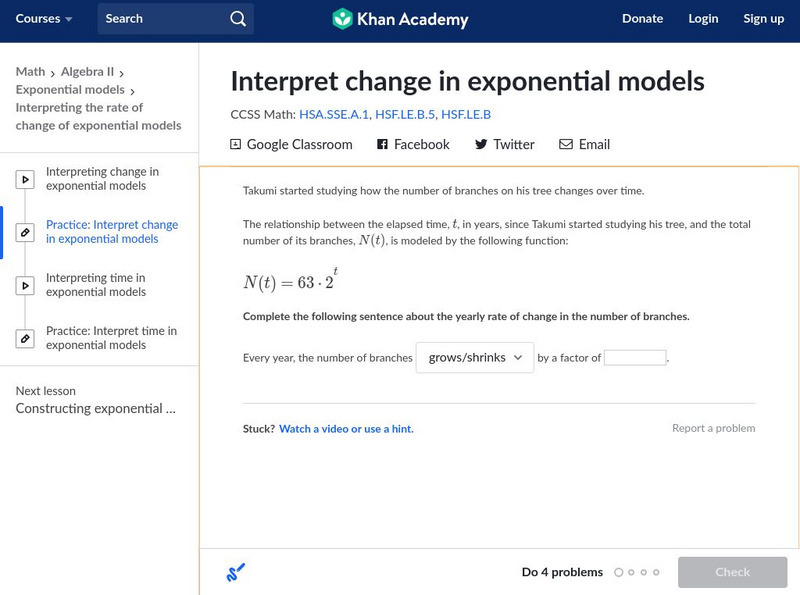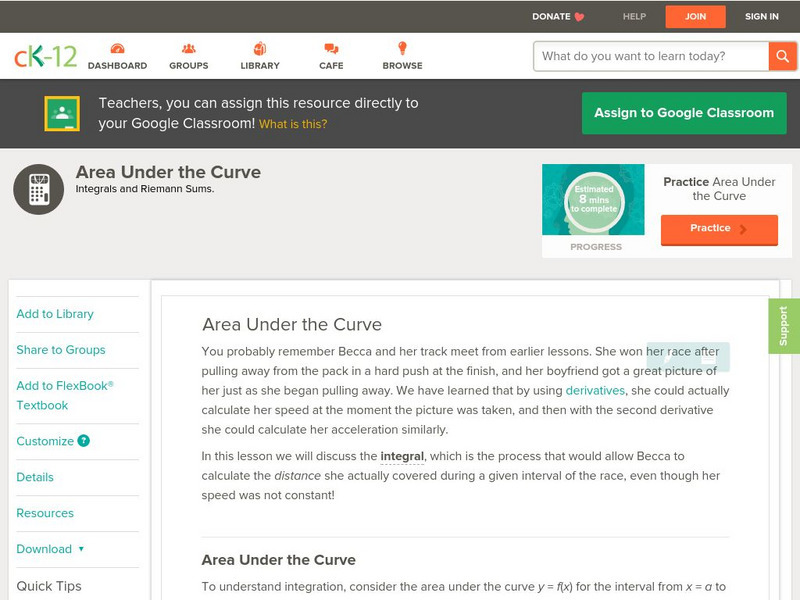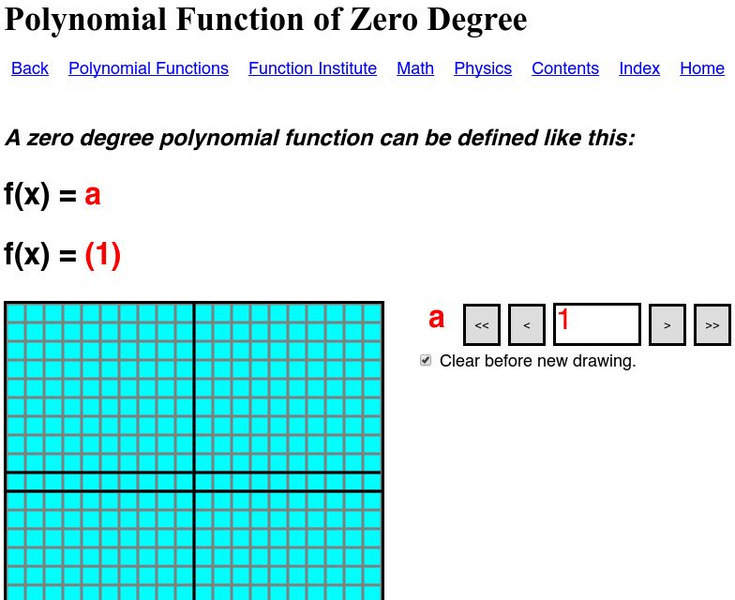Khan Academy
Khan Academy: Algebra 2: Compare Features of Functions
Compare various features between two functions, each represented in a different way. Students receive immediate feedback and have the opportunity to try questions repeatedly, watch a video or receive hints.
Khan Academy
Khan Academy: Interpret Change in Exponential Models
Given a function that models an exponential situation, find the factor by which the quantity changes per unit time interval. Students receive immediate feedback and have the opportunity to try questions repeatedly, watch a video or...
Khan Academy
Khan Academy: Interpret Time in Exponential Models
Given a function that models an exponential situation, find the time interval over which the quantity changes by a given factor. Students receive immediate feedback and have the opportunity to try questions repeatedly, watch a video or...
Khan Academy
Khan Academy: Algebra Ii: Construct Exponential Models
Given a verbal description of the rate of change of a real world situation, find the exponential function that models it. Students receive immediate feedback and have the opportunity to try questions repeatedly, watch a video or receive...
CK-12 Foundation
Ck 12: Analysis: Average Rate of Change
[Free Registration/Login may be required to access all resource tools.] Defining average rate of change and evaluating simple examples
CK-12 Foundation
Ck 12: Trigonometry: Applications of Inverse Trigonometric Functions
[Free Registration/Login may be required to access all resource tools.] Here you'll learn how to apply inverse trig functions to solve problems you would see in real-life situations.
Other
Karl's Calculus Tutor: Derivative of Inv. Trig Functions
This site provides a general overview of the derivative of inverse trig trunctions. Content includes a proof, exercises, and more.
Khan Academy
Khan Academy: Interpret Expressions That Represent a Quantity in Terms
Interpret expressions that represent a quantity in terms of its context.
Khan Academy
Khan Academy: Accumulation of Change
Practice associating the area under rate-of-change curves with net change.
Khan Academy
Khan Academy: Analyzing Problems Involving Related Rates
Related rates problems are word problems where we reason about the rate of change of a quantity by using information we have about the rate of change of another quantity that's related to it. Let's get acquainted with this sort of problem.
Khan Academy
Khan Academy: Analyzing Problems Involving Rates of Change in Applied Contexts
Differential calculus is all about instantaneous rate of change. Let's see how this can be used to solve real-world word problems.
Khan Academy
Khan Academy: Interpret Time in Exponential Models
Given a function that models an exponential situation, find the time interval over which the quantity changes by a given factor.
Khan Academy
Khan Academy: Identify Function Transformations
Practice the concept of function scaling and the relationship between its algebraic and graphical representations.
Khan Academy
Khan Academy: Shift Functions
Shift functions horizontally and vertically, and practice the relationship between the graphical and the algebraic representations of those shifts.
Math Open Reference
Math Open Reference: Average Value
A complete reference guide to the average value. It provides a definition and examples that enhance further explanation. Includes links to related topics.
Khan Academy
Khan Academy: Interpret Change in Exponential Models
Given a function that models an exponential situation, find the factor by which the quantity changes per unit time interval.
Khan Academy
Khan Academy: Verify Inverse Functions
Given the formulas of two functions, compose the functions and determine whether they are inverses of each other.
Khan Academy
Khan Academy: Periodicity of Algebraic Models
Given the graph that models a real world context, answer a question about the periodicity of the graph.
Khan Academy
Khan Academy: Interpret Change in Exponential Models: With Manipulation
Given a function that models an exponential situation, rewrite the function in order to analyzeits rate of change.
Khan Academy
Khan Academy: Interpret Change in Exponential Models: Changing Units
Given a function that models an exponential situation, rewrite the function in order to find its change for a different time unit.
CK-12 Foundation
Ck 12: Algebra Ii: 3.6 Transformations of Log Functions
This section explores the many ways that logarithmic functions can be transformed, and how those transformations cause their graphs to be translated in different ways.
Khan Academy
Khan Academy: Average Rate of Change of Polynomials
This quiz tests your ability to find the average rate of change of a function over a given interval.
Other
Nearpod: Exponential Functions
In this lesson, young scholars will use the exponential function equation to solve real-life problems involving exponential growth and decay including the compound interest formula.
Curated OER
Zona Land/the Function Institute/poly. Function/graph
Contains an applet that allows you to graph a constant function. An example is set up; you can change the constant.






















